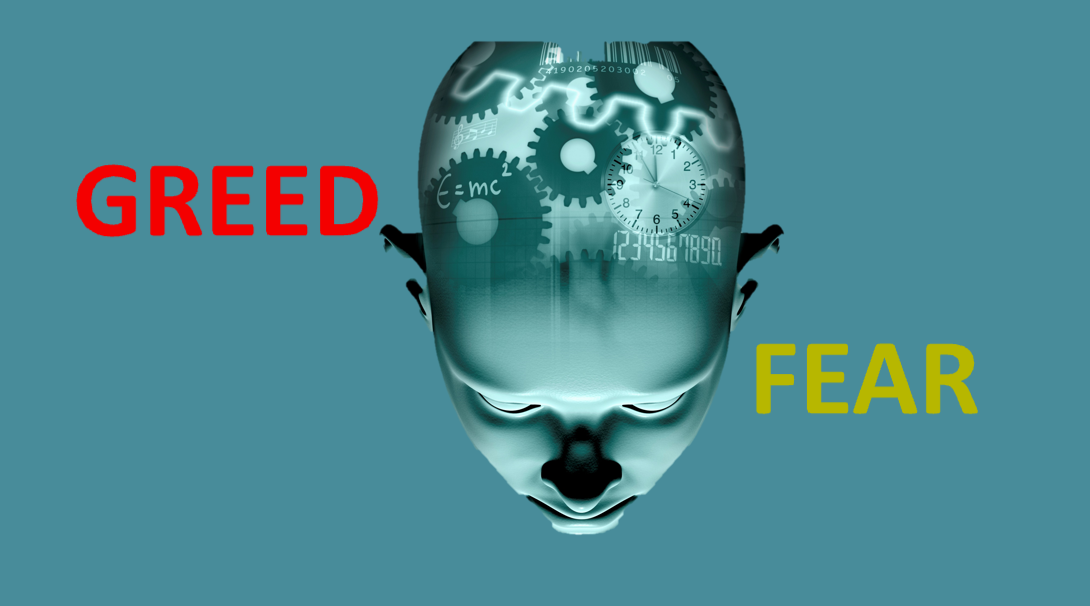The two most dominant drivers in the market of investments are the generally inseparable emotions of Greed and Fear. Despite best efforts, it is difficult to prevent these emotions from influencing our decision making. Greed and Fear propel every investors urge to time the market. But like all other emotions, it would be difficult to categorize them as Good or Bad. One can however try to exploit the good of these, and develop immunity against the side effects.
What is Greed ?
In the world of investments, Greed would simply mean the urge/desire to grow/multiply wealth in the shortest possible time frame. A little bit of greed has to be present in every investor. Else, he would not have been investing at the first place. But as one starts experiencing the roller coaster ride of markets, the animal instincts take over. Investor starts thinking that there is some way of remaining on the winning side at all times. One gets a feeling of missing out on something and follows the crowd. He does so without analyzing the fundamental factors influencing the outcome of his decision.
What is Fear ?
The simple opposite of Greed is Fear. The apprehension that one would lose money if he/she does not take a particular decision. This is most visible during bad sentiments in the market. Fear makes people rush to cash out in the hope of entering at further lower levels. The feeling of fear remains till such time there is another upswing in the market. Most of the market crashes happen due to the collective fear of all or most of the investors.
Effect on Market
The volatility witnessed in the markets is primarily a result of the interplay of Greed and Fear. When most investors think that the market is going to rise, the valuations go up. Any negative sentiment based on facts or rumor ignites the fear hormones and people start selling. This leads to to more than expected falls. Both during the upswing, and the downswing, comes a stage when the rational investor takes a contra position. When the movement exceeds the natural outcome of the underlying economic factor, it makes more sense to replace Fear with Greed and vice versa. This is generally the stage when the rise/slide is arrested and the direction of movement is reversed. Warren Buffet, has described the strategy in simple terms – “Be fearful when others are greedy, and greedy when others are fearful”.
The Dilemma !
The issue seems simple to understand. But the problem is that though everyone knows what has happened so far, no one knows what is going to happen in future. In such a situation we generally tend to superimpose the supposedly all powerful sixth sense on the available inputs to justify our decisions. There are only two possible outcomes to such a decision. Either it turns out as expected, or it does not. The simple probability of success therefore is 50%. This means that almost half of the times we will be right, and other times wrong. This is an outcome of sheer probability with no reference to the intuitive or analytical force behind the decision.
What Does Empirical Evidence Say ?
Historical data indicates that taking decisions too frequently in the Equity Market does not have any reliable positive correlation to higher returns. To the contrary, some of the richest guys are those who despite the prevailing conditions in the market, did not take any action. Undeterred by the market swings, they just let their investments grow over time. The 50% success rate also indicates 50% rate of failure, implying it to be a zero-sum game. Frequent transactions also increase the overall cost of investment thereby reducing the returns. Past data however also suggests that some very good investments became worth nothing over time. Investors lost lot of wealth just trying to follow the age-old advice of letting investments grow over time. Boxed between the contradictory evidence and the opposing emotions of Greed & Fear, lies the dilemma of the investor driving the urge to time the market.
Is Timing Bad ?
To say that timing is bad would be incorrect, as all decisions are effective or otherwise, based on the Timing. I would rather say that timing the decision is ok, but timing the market may not be. The art probably lies in remaining rational while others around you are propelled by vague theories and predictions. If one is bold enough to show fear when others are greedy, and be prudent when all around are gripped with fear, there is a good time to take the right decision. Trying to take a decision purely based on market expectations is most likely to backfire. There are more people in the market who exit when rationality demands entry, and enter when fundamentals indicate exit, thereby losing more than what they gain.
Recommendations
One has to live with the realities of Equity markets and the human emotions of Greed & Fear. I would therefore advise the following:-
(a) Do not try to grow rich fast, and Never try to time the market.
(b) Develop consciousness of the natural feelings of Greed & Fear, and try not to succumb to either of these.
(c) Take a fundamental view of the situation and analyze all available inputs in a rational and unbiased manner.
(d) Be regular in your decision making by making periodic readjustments based on Portfolio performance and not on market conditions.


4 replies on “Greed/Fear and The Urge to Time the Market”
A good article sir.
Thanks Col Chauhan.
Quite a balanced approach to the market, so very well sounded.
Excellently analysed Rajesh. Bang on! Unfortunately the decision of when to replace greed with fear and vice versa os the million dollar Q! For eg with the mkts touching new highs every alternate day, without adequate fundamental support os scary..but then the analysts come up with enough seemingly logical reasons for the upswing..dilemma remains 🙄